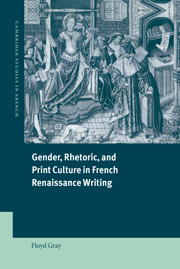Conclusion
Published online by Cambridge University Press: 22 September 2009
Summary
In many ways, the early modern period in French literature begins with the feminization of writers and readers, at once provoking and promoting what we have come to call the Querelle des femmes, which, originally at least, concerned the proper place of women in life and letters. At the outset, as we have seen, this exchange is exclusively between men, who take opposite sides, either as detractors or praisers of women, on what had become increasingly a rhetorical question, one already raised in classical treatises as appropriate for the training of students in the art of argumentation in utramque partem, and recently renewed through the medium of printing.
Feminist or antifeminist arguments advanced and defended by male protagonists were generally ready-made, catalogued and codified by centuries of tradition. Rather than conveying original reasons or personal prejudices, they were essentially indefinite and derivative display pieces. Conceived to impress and convince, their point of view depended more on commonplace than on psychological or philosophical exploration. It is not until Christine de Pisan's reply to Jean de Meun's Roman de la rose that misogynistic discourse was transformed momentarily into the discourse of misogyny, structured by differences in gender as well as perspective, and that the age-old debate about the vices and virtues of women finally developed into the Querelle des femmes, which was to become one of the principal literary events of early modern France.
- Type
- Chapter
- Information
- Publisher: Cambridge University PressPrint publication year: 2000



